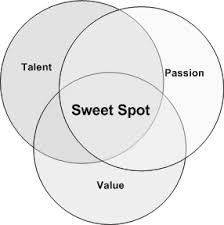Daniel Coyle (2009), The Talent Code: The Sweet Spot (chapter one of part I: Deep Practice)
Are prodigies brought down by storks or are they forged in the fires of determination as the assiduous hammer of practice strikes the Persistent. Widely believed to be a ‘sent-down-by-God’ kind of an affair, talent is supposedly innate. But if this be true, how is it that we find individual talent coming out in numbers from similar socio-geographical backgrounds? Are the Gods too fond of their patron?
“Talent is cheaper than table salt. What separates the talented individual from the successful one is a lot of hard work.” -Stephen King
In his cultural myth-breaker, ‘The Talent Code’, author Daniel Coyle goes a step ahead and clearly claims that -Talent isn't born, it's grown. In the focused excerpt, we find the author emphasizing on the presence of a “sweet spot” which requires “deep” practice to bring about expertise.
The author starts by narrating his journey across the varied geography in search of talent “hotbeds” which he describes to be similar to the voyage of Charles Darwin (The English Naturalist who went around the world and later gave his theory of evolution). He too was in pursuit of finding similar evolutionary amongst the so called ‘hotbeds’ or “Chicken-wire Harvards”. He then goes on to state the similarity in his observation that "talent" is "the possession of repeatable skills (Coyle, 11)”, and there is a particular thought process and routine which much be undertaken to sharpen one's skill. He draws our attention to the “split second” variations in the cogitation of these prodigies, stating that this change is due to deeper practice- where one struggles on the edge of one’s ability thus ends in learning from one’s mistakes. He goes on to cite Robert Bjork (chairperson UCLA), stating that "One real encounter, even for a few seconds, is far more useful than several hundred observations (Coyle, 18)" and the fact that the human brain has infinite potential and the more the number of obstacles we face, the more we learn.

Further he goes on stressing on the importance of deep practice by giving the example of Roosevelt's “ Airmail Fiasco” which was solved by Edwin Albert Link, Jr.’s unlikely Blue Box device which trained the pilots Link's trainer permitted pilots to practice more deeply, to stop, struggle, make errors, and learn from them. During a few hours in a Link trainer, a pilot could “spend hours inhabiting the sweet spot at the edge of his capabilities in ways he could never risk in an actual plane. (Coyle, 24)” The Air Corps pilots who trained Links were no braver or smarter than the ones who crashed. They simply had the opportunity to practice more deeply.
Coming onto “ Brazil secret weapon”, the authors unveils Brazil’s secret in form of futsal - football’s poor cousin- which produced some of the greatest footballers of all time.
Further he goes on stressing on the importance of deep practice by giving the example of Roosevelt's “ Airmail Fiasco” which was solved by Edwin Albert Link, Jr.’s unlikely Blue Box device which trained the pilots Link's trainer permitted pilots to practice more deeply, to stop, struggle, make errors, and learn from them. During a few hours in a Link trainer, a pilot could “spend hours inhabiting the sweet spot at the edge of his capabilities in ways he could never risk in an actual plane. (Coyle, 24)” The Air Corps pilots who trained Links were no braver or smarter than the ones who crashed. They simply had the opportunity to practice more deeply.
Coming onto “ Brazil secret weapon”, the authors unveils Brazil’s secret in form of futsal - football’s poor cousin- which produced some of the greatest footballers of all time.
The author’s emphasis on the presence of a “sweet spot” is brought out wonderfully through the tapestry of examples given, though the actual definition is not very clear. We are told that “There an optimal gap between what you know and what you're trying to do. When you find that sweet spot, learning takes off.(Coyle, 19)". But as to how to find this mystical edge (so that we can take this leap of faith?) is still hazy. He just goes to stress upon the need to deep practice ad nauseum (which is rather ironic given the subject matter focuses on concentrated practice and not mere repetition).
The concept of deep practice seems to be derived from Kolb’s theory of experiential learning(Theories of Group Process,1975). Kolb's research found that people learn in four ways with the likelihood of developing one mode of learning more than another. As shown in the 'experiential learning cycle' model above, learning is:
- Through concrete experience
- Through observation and reflection
- Through abstract conceptualization
- Through active experimentation.
This is exactly what Coyle describes as deep practice.
The only commendable aspect of the given article was the variety of examples and instances which presents the idea in a simplistic way thus allowing the most casual reader to imbibe his ideas with ease. A good takeaway from this book is the fact that “Having fun” isn't the primary goal of people who want to get good, though they find what they do pleasurable on some level (or at least necessary) and push through all the difficulties and challenges. The cognizance of the author does not seem to be path-breaking. It avoids becoming just another syrupy self-help book by stressing the importance of hard work and dedication, but it doesn't bring too many new insights to the table.
References:
"The Sweet Spot" by Daniel Coyle
Wikipedia: "Insight learning", "Airmal Fiasco".
0 comments:
Post a Comment